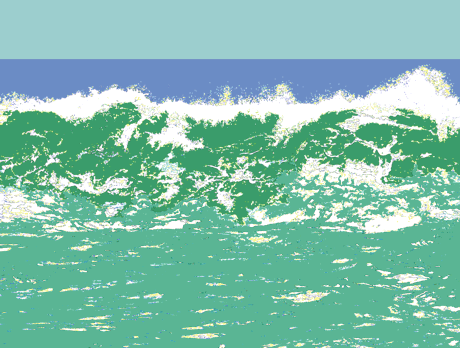[vc_row][vc_column][vc_column_text]
I am text block. Click edit button to change this text. Lorem ipsum dolor sit amet, consectetur adipiscing elit. Ut elit tellus, luctus nec ullamcorper mattis, pulvinar dapibus leo.
[/vc_column_text][/vc_column][/vc_row][vc_row][vc_column width=”2/3″][vc_column_text]

afbeelding: © Hans Groen
This is a summary of the discussion that took place at the Vijverbergsession of April 2nd, 2014. First the general idea behind the Ocean Summit of April 22-25, 2014, is explained (1). Then a couple of issues that were discussed are summarized: the use of aquaculture (2), the Areas Beyond National Jurisdiction (3), and the role of the private sector (4). In (5), some conclusions for governance of the oceans are formulated.
The discussions at this Vijverbergsession were introduced by Hans Hoogeveen, DG Agro Ministry of Economic affairs. Chairman was Johan van de Gronden, CEO of WWF-Netherlands. This summary was written by Hans Groen, Socires, with thanks to Reinier Hille Ris Lambers, WNF for improvements to the final text.
1 – Why the Ocean Summit in April 2014?
The Ocean Summit 2014 addresses three issues which are intrinsically interconnected, but are often treated in isolation: biodiversity, climate change, and food security. It has become clear that one cannot solve food security without addressing climate change or biodiversity. That also means that there is not one single actor that can solve these issues. The solution lies in collective action by different actors who each have their own logic of action. The solution has to come from the pentagon that consists of government, private sector, NGOs, academics, and politics.
The model the Ocean Summit follows is that of the Climate Smart Agriculture Programme that connected the issues of agriculture, food security, and climate change, and that shall present its results on the Climate Summit in the fall of 2014. The success of this programme showed that it is possible to connect issues that usually are discussed separately. Effects of climate change are much more visible in agriculture, which made it easier to break through the walls between discussions; but when one looks at the effects of climate change on the oceans, there is as much reason for alarm. 80% of bio-diversity is related to life in the oceans. Habitat protection and governance of the oceans thus are important.
The Ocean Summit shall follow a similar path of connecting the isolated discussions of fisheries, biodiversity, and climate change. The World Bank and the FAO are also involved in this trajectory.
The central focus of the Ocean Summit is food security â?? â??food FIRSTâ??. The role of the oceans as a provider of animal protein is underexposed in the discussion of food security. 17% of animal protein consumed every day is provided by fishing. As a source of protein, poly-unsaturated fat, and omega-3, the oceans are more important than agricultural land. About 3 billion people are dependent on fishery for 20% of their daily protein intake. 8 million people are dependent on fishing for their livelihood. Fishing and the protection of habitats are crucial to addressing the food situation in 2050.
The EU agreed in 1992 to reach a sustainable yield in the fishing industry by 2015. Now, in 2014, we have not come close to reaching this target. Rather, talks call for a longer time path. However, if we do nothing, at around 2030 there will not be enough fish in the sea to equal our current catch. We have to promote sustainable fishery, and decrease unsustainable practices.
There are not many world-wide organisations that can address the issues of fisheries, unlike in agriculture where numerous intergovernmental organisations exist and international, regional, and national agreements on regulations are reached. The FAO does some work with fisheries, but otherwise the oceans are ruled by the law of the sea and only voluntary agreements exist. What is positive is that regional organisations have acquired a stronger voice. That opens the option of strengthening their mandate in order to preserve local fisheries, make them switch to more sustainable practices, and protect the local fisheries from industrial fisheries from elsewhere.
For its new fishery policy, the EU has chosen for a tri-partite approach of government, science, and the fisheries. It has made better procedures for bringing fish to shore that make it more clear what is caught and how much of it, thus improving governance of the fish stocks in the oceans. Also, the programme stimulates local fisheries outside Europe.
There is a vast stock of knowledge available; what are lacking are programmes for action that identify those who are in a position to bear responsibility. Governments, private sector, academics, civil society shall be present in person at the Ocean Summit and the setting of the summit is such that all these persons will encounter each other: the seats in the conference are not grouped according to nation or sector, but in alphabetical order.
As results of the Summit the Ministry of Economic Affairs aims at public-private partnerships that can work out real change and that strengthen regional cooperation for durable governance. Money for food security and habitat protection should not go to governments but to local organisations that can make a difference; it is the local and regional community that has to profit.
2 – Aquaculture
Aquaculture can reduce the pressure on the stock of fish in the oceans. At the moment, the ratio aquaculture and wild fish is about 50/50. The share of fish from aquaculture is expected to rise to 60, even 70%. There are several issues around aquaculture. One is the pollution of the seabed under a farm. More related to food security, the focus of the Summit, is the production of food for fish farms and the use of antibiotics. It used to be that one needed 5 kilo of wild fish for 1 kilo of farmed fish. At present, the ratio is about 1 on 1, even slightly better. Still, the mass production of food needed for aquaculture is an issue.
Second, good governance is mandatory for aquaculture. It is a form of intensive farming for which good management and supervision is essential. Inexperienced governments and loopholes in regulations have already led to local disasters, e.g. salmon farming in Chile.
There is a limited number of kinds of fish that can be farmed on a large scale. Salmon is an easy one. The biggest challenge, or virtually impossible, is eel. With cod and sole, satisfying results have not been booked yet. However, farming cod and sole fish would provide an alternative for wild fish in places where people are not overly interested in MSC-certification.
3 – Areas Beyond National Jurisdiction
The summit does not aim at creating new legal instruments for the governance of the ocean. That is not meant to deny that the lack of juridical binding international agreements regarding the governance of the oceans is a problem. It is rather that it is thought that empowering local governments and organisations will be more effective.
The contribution of the open ocean, where there are hardly any rules and few ruling bodies, is relatively small and only affects a limited number of fish stock. The bulk of fish is caught off the coast, within a 200 mile zone.
For example, in Nicaragua a collective was formed to improve fish stocks off the coast. The mangrove forests that function as breeding ground for fish were cleaned, and fish stock improved. When it appeared that foreign trawlers went away with the catch, the fishers as a collective were able to move the government to declare a 200 mile zone and to undertake action against foreign fisheries.
This example underlines the need to seek for the cooperation of local organisations; governments alone often are not able to act effectively. Important is that the local communities are also enabled to sell to the regional market.
It still remains a problem that most of the sea does not fall under national jurisdictions, and that players are unscrupulous. There are big players that just move on to the next spot when they have emptied a particular part of the sea. Much depends on regional cooperation because individual governments are not always strong enough to withstand the big fisheries from foreign countries. But even when there are working agreements, like in the EU, there is a danger that when the catch is not big enough, countries might sell their rights to outsiders such as Russia or China, who then empty your sea.
The Summit puts the emphasis on cooperation between governments and fishery organisations to solve these issues, and not on new juridical structures. As an example that that can work, the MSC-label was given: This is a large scale, global model that functions and under which flag all parts of the fishery chain have come to agreements.
4 – Private sector
What incentives are there for businesses? Important lessons were learned with the salmon farms in Chile: without proper management and proper governance, the business collapsed. For regulating the fisheries, creating a level playing field is important for the cooperation of the private sector, so some minimal involvement by governments is necessary, also to prevent illegal fishing, for instance.
NWO-WOTRO currently prepares a research programme for developing inclusive business models: businesses can fail due to a lack of knowledge, governance, regional agreements, and countervailing powers such as consumers to address bad practices. In this context, private foundations such as the Clinton foundation can make a difference by providing the means to redirect a business model towards care and recovery. Compared to the subsidies that governments give to their fishers, the funds are very small, but they are available and big enough to make a difference when business wants to invest.
Consumers have an important role in changing business practices. Though the Summit is not a consumer summit, being the last link in the chain the consumer is an important player in realizing sustainable governance of the ocean. What is bought in the shop and on the market is an important incentive for the industry. However, that mainly goes for the Western consumer who is triggered by certifications such as MSC. Elsewhere on the regional markets, durability is less of an incentive for the consumer and we have to find incentives for providing better products also for those markets.
5 – Conclusions
The oceans are a source of 17% of our animal protein intake. Business as usual scenarios will tell us that fishery will erode rapidly, even without taking into account climate change; hence the Summit. The explicit objective is to facilitate Public Private Partnerships where five actors take action, aiming at 15 concrete projects.
Summing up some points made in the discussion:
» Strengthening and empowering local organisations and communities is central to sustainable governance of fishery. Governments alone often are not able to act effectively.
» Developing business models that are directed at care and recovery is needed, together with financial support for habitat protection.
» Research tells that Public Private Partnerships are often not successful.
» Governments have to be explicitly addressed as actors. When 60 ministers and prime-ministers are present, a set of PPPâ??s cannot be the only outcome. There is, as we see it, a governance crisis that will hinder action, and there is a lack of intergovernmental management bodies. Governments are important for creating the environment and safeguards for regional agreements between fishery and other organisations and for creating a level playing field.[/vc_column_text][/vc_column][vc_column width=”1/3″][vc_column_text]Vijverbergsession, 2 april 2014
In preparation on the Global Oceans Action Summit, 22 april – 25 april 2014,[/vc_column_text][/vc_column][/vc_row][vc_row][vc_column][vc_column_text]
I am text block. Click edit button to change this text. Lorem ipsum dolor sit amet, consectetur adipiscing elit. Ut elit tellus, luctus nec ullamcorper mattis, pulvinar dapibus leo.
[/vc_column_text][/vc_column][/vc_row]
